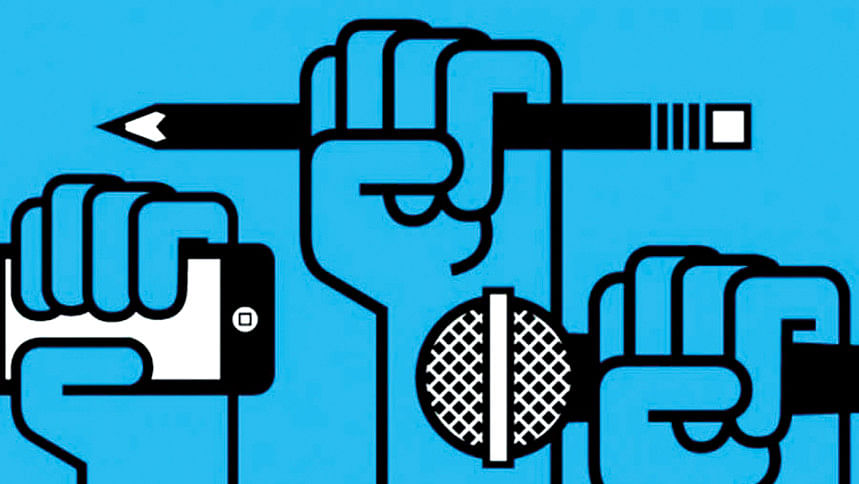Between blasphemy and sedition Parity of justice for freedom of expression

Although in postmodern values, both ideas of religion and nationality are disregarded as subjective truth, which exist only in the psychological realm; historically, people of this subcontinent demonstrated affinity for the homeland and fostered devotion for their deity at the same time. They fought for political autonomy but managed to successfully subdue various forms of communal discord within the territory. The reflection of their history can also be seen in the Penal Code 1860, which sanctioned blasphemy and sedition in sections 124A and 295A, respectively. But imperceptibly, the country has been indoctrinated towards a new trend that the presentation of piety and celebration of patriotism cannot coexist in our democratic dynamics. Faithwears are often regarded by many as a threat to the body politic. In contrast, a revulsion against symbols of statehood, such as the flag and the national anthem, is on the rise.
This trend began with a deliberate attempt to confuse the cognitive orientation of the general mindset about the idea of "freedom of expression". It is the author's opinion that the ruling class recognised that if the offence of blasphemy and sedition could be adulterated, a controlled altercation among the citizens would ceaselessly continue. Thus, they will be able to manipulate public debate and subtly subjugate judicial oversight of the "inalienable constitutional right".
Originally, Article 39 of the Constitution guarantees the freedom of "thought and expression," which is, however, "subject to [certain] reasonable restrictions". Restriction is reasonable if it is imposed by law, inter alia, in the interests of public order, or to prevent criminal incitement. Because one's unfiltered opinion cannot completely ignore the social setup in which our audience is addressed, Article 39 justifiably attempted to reconcile the right and the responsibility to look after the effect of its exercise.
The ruling class recognised that if the offence of blasphemy and sedition could be adulterated, a controlled altercation among the citizens would ceaselessly continue. Thus, they will be able to manipulate public debate and subtly subjugate judicial oversight of the "inalienable constitutional right".
Later, the Information and Communication Technology Act 2006 (ICTA) and the Digital Security Act 2018 (DSA) came to the forefront. Section 57 of the ICT Act criminalises the publication of any material that prejudices the image of the State or person or creates any possibility to hurt religious belief. The question popped up— what is the test to determine 'level of the image' and the 'magnitude of the hurt' to call an expression an offence? Judicial review was expected to safeguard the sacredness of free speech, yet, by this stage, it was predisposed to unprecedented legal philosophies.
As a general rule, an act is considered an offence if it is committed with malicious intention and causes some detectable harm. But in the digital era, the subjective reaction of the person at the end of the communication became an all-important element. One High Court Division Bench felt "shocked and humiliated" by a documentary titled "All the Prime Minister's Men". It declared in the case Md. Anamul Kabir Emon v Bangladesh and Ors. [WP No. 1839 of 2021] that "when millions of people across the globe have viewed the documentary and made adverse comments on it obviously demeaning the dignity and honour of the highest authority of the republic." Again, one host Khadijatul Kubra was charged under the DSA for "anti-government propaganda and tarnishing the country's image" because her guest in an interview spoke against the government. The Appellate Division of the Supreme Court of Bangladesh was reported to have said that "being a university student Khadiza [no matter she is a minor] has to bear the liability of any comments her interviewee may makes." [voabangla.com, 10 July 2023]
With the advent of the DSA and ICTA, a way to curb the constitutional guarantees was laid out. The process commenced with the creation of a delusion as to the concept of freedom of expression. All of a sudden, everyone felt intimidated by the views of everyone else. That resulted in a muted hostility between theology and civics. An infatuation, in turn, for socio-political wrangling engulfed social media and the internet. Sometimes, the suppressed feelings of antipathy to one another erupted into volcanic resentment.
In such a course, pretext was found to curtail freedom of expression by making draconian laws. Under a pretentious justification for ensuring public order, a popular mandate for the legislation was managed. A textbook exemplification of the warning given in Turner Broadcasting System v FCC (1994) that "Laws of this sort pose the inherent risk that the Government seeks not to advance a legitimate regulatory goal, but to suppress unpopular ideas or information or manipulate the public debate through coercion rather than persuasion" could be seen.
The salvation from such statutory clutches lies in the true notion of the freedom of expression and balancing between individual rights and the community interests. The whole enigma is explained in the works of philosopher Jean-Jacques Rousseau. We suspend the peripheral practices of the freedoms in order to save their core existence. Unless the urge for unfettered freedom is restrained by ourselves, nobody is actually free except the ones who sits under a powerful tree and has the reign in their hands.
The writer is Assistant Registrar (Assistant Judge), High Court Division, Supreme Court of Bangladesh.

 For all latest news, follow The Daily Star's Google News channel.
For all latest news, follow The Daily Star's Google News channel. 



Comments